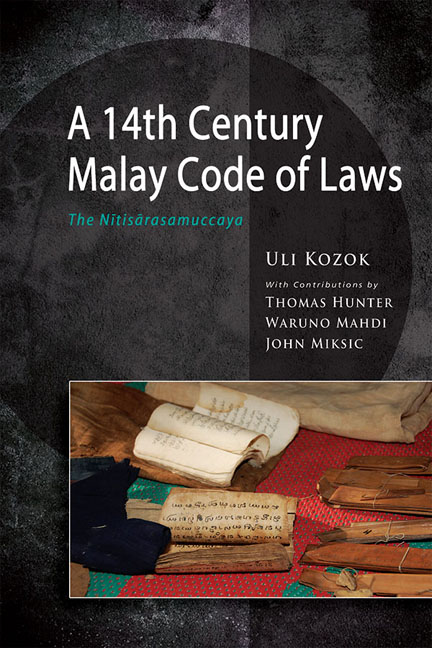Book contents
- Frontmatter
- Contents
- List of Tables
- List of Figures
- Abbreviations
- Preface
- About the Contributors
- 1 Pusaka: Kerinci Manuscripts
- 2 Kerinci and the Ancient History of Jambi
- 3 Tanjung Tanah Manuscript TK 214
- 4 Script and Language of the Tanjung Tanah Manuscript
- 5 Tanjung Tanah Manuscript TK 215
- 6 Sanskrit in a Distant Land: The Sanskritized Sections
- Bibliography
- Index
- Nalanda-Sriwijaya Series
- Images of TK 214
1 - Pusaka: Kerinci Manuscripts
Published online by Cambridge University Press: 19 May 2017
- Frontmatter
- Contents
- List of Tables
- List of Figures
- Abbreviations
- Preface
- About the Contributors
- 1 Pusaka: Kerinci Manuscripts
- 2 Kerinci and the Ancient History of Jambi
- 3 Tanjung Tanah Manuscript TK 214
- 4 Script and Language of the Tanjung Tanah Manuscript
- 5 Tanjung Tanah Manuscript TK 215
- 6 Sanskrit in a Distant Land: The Sanskritized Sections
- Bibliography
- Index
- Nalanda-Sriwijaya Series
- Images of TK 214
Summary
One can safely say that the Tanjung Tanah manuscript TK 214, originally written in Dharmasraya, some 250 kilometres from Kerinci, owes its existence to the people of Kerinci who safeguarded the manuscript for almost 700 years as one of their sacred heirlooms. It is for this very reason that we find it not only appropriate but necessary to discuss the circumstances that led to the survival of the manuscript and to introduce the amazing collection of manuscripts spread over dozens of villages in the residency of Kerinci.
The tradition of keeping sacred heirlooms is not limited to the people of Kerinci but is widespread in the Indonesian archipelago. Although Islam is now universally embraced as the only religion of the Kerinci people, pre- Islamic customs often survived or were reshaped or reinterpreted to be coherent with Islamic beliefs. A unique blend of adat (customs) and agama (religion) is indeed characteristic of the Indonesian society as a whole. The pre-Islamic religion of at least most parts of western Indonesia was characterized by a syncretism of ancestor worshipping with Hindu-Buddhist and animist elements. This set of beliefs did not automatically vanish with the introduction of Islam, and is especially evident in the veneration for the forefathers that still holds a high place among many Muslim Indonesians. The sacred heirlooms called pusaka are a living manifestation of the glory of the ancestors, and were especially important for the traditional ruling elite for whom they served as a concrete symbol of authority, legitimacy, lineage, and succession.
In Kerinci, pusaka are mainly found within the traditional ruling lineages and are in the possession of the depati. Although leadership is always a matter of the male domain, the title itself is, together with the pusaka items that are innately linked with the depati-ship, inherited through the female line from mother to daughter. Ideally, it is the eldest daughter of the present depati who inherits the pusaka, and whose husband succeeds his father-in-law as the new depati. There are, however, also other considerations such as the capability of the candidate for the depati-ship, and it is not uncommon that the pusaka are entrusted to a younger daughter, or another member of the lineage.
- Type
- Chapter
- Information
- A 14th Century Malay Code of LawsThe Nitisarasamuccaya, pp. 1 - 16Publisher: ISEAS–Yusof Ishak InstitutePrint publication year: 2015

